
- Oct 10, 2025
Pfizer’s Global Trade in Medicines: A 2025 Outlook
Pfizer is still one of the most well-known names in the constantly changing world of international medicines.
As per USA Import Data by Import Globals, with yearly sales of USD 63.6 billion as of 2024, the American pharmaceutical behemoth continued to rank in the top five globally. Pfizer's exports and worldwide presence continue to influence healthcare markets in more than 200 countries, despite obstacles including diminishing sales of COVID-related products and fierce competition from generics and biosimilars.
Over the past 20 years, as per Pfizer Export Data by Import Globals, Pfizer has seen exponential growth as a worldwide exporter. Pfizer's success has consistently been linked to its trade network, strong manufacturing scale, and savvy licensing agreements, from creating popular medications like Lipitor and Viagra in the early 2000s to becoming a key player in the global supply of COVID-19 vaccines.
A Genuinely Worldwide Presence
Pfizer has a huge production and trading network. The business collaborates with more than 300 outside suppliers and runs more than 35 production facilities across the globe. Based on Pfizer Import Export Trade Data by Import Globals, Pfizer is able to generate billions of doses of medications and vaccines every year because to these facilities. These goods are transported across continents to get to patients, pharmacies, and hospitals in almost every nation.
Pfizer Export Data
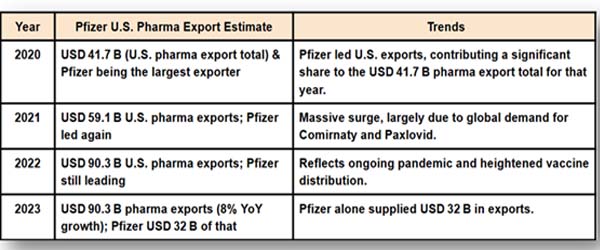
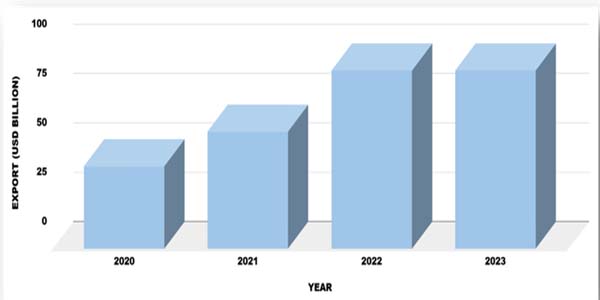
The United States continues to be Pfizer's primary market, accounting for roughly 61% of its revenue in 2024, based on USA Customs Data. Exports and international alliances, however, accounted for the remaining 39% of sales, with significant markets in Europe, China, Latin America, and developing Asian and African economies.
Remarkably, as per China Import Trade Analysis by Import Globals, Pfizer's influence in the Chinese market is expanding quickly, although its direct export share to China only makes up around 4% of its total sales. Pfizer and China's 3SBio inked a USD 6 billion licensing agreement in 2025 to jointly develop and market a new cancer medication. This collaboration follows a broader pattern in which large Western pharmaceutical companies enter Asian markets through joint ventures and licensing to get around tariffs, regional laws, and financial obstacles.
Supply Chain Resilience & Manufacturing Strength
Pfizer's strong supply network is one of its main advantages in international trading. To ensure resiliency, the corporation has made significant investments in automation, AI-driven logistics, and new manufacturing technology. According to Pfizer Export Data by Import Globals, over 146 nations received Pfizer's mRNA vaccine, Comirnaty, during the COVID-19 pandemic, proving the company's capacity to manage extensive exports under extreme time constraints.
Top 5 Global Pharmaceutical Companies
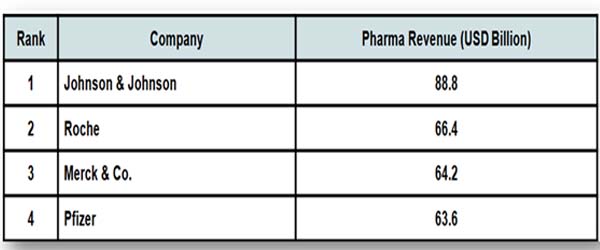
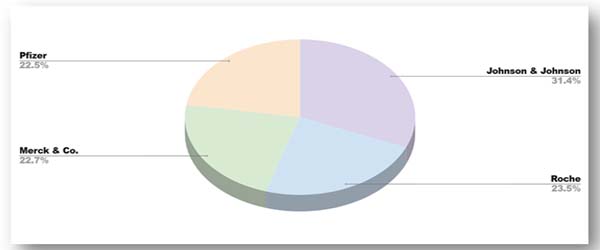
Pfizer kept updating its plants in the United States and abroad in 2024–2025 to reduce the risk of geopolitical unrest and possible trade restrictions based on USA Import Data. To ensure local production of injectables, biologics, and vaccines, the company has expanded its facilities in Michigan, Belgium, Ireland, and Singapore.
There are substantial cost-cutting initiatives associated with this upgrading. By the end of 2025, Pfizer anticipates saving USD 4.5 billion in operating costs, and by 2027, another USD 1.2 billion. To boost exports, these savings are put back into supply chain improvements and research and development.
Leading Export Drugs
A small number of popular medications and vaccines that continue to fuel demand globally make up the majority of Pfizer's export portfolio. As per Pfizer Import Trade Statistics by Import Globals, Eliquis (blood thinner), Comirnaty (COVID-19 vaccine), Paxlovid (COVID-19 antiviral), Vyndaqel (heart disease medication), and Prevnar (pneumonia vaccine) together accounted for almost USD 30 billion of its yearly revenue in 2024.
Pfizer’s Leading Export Drugs
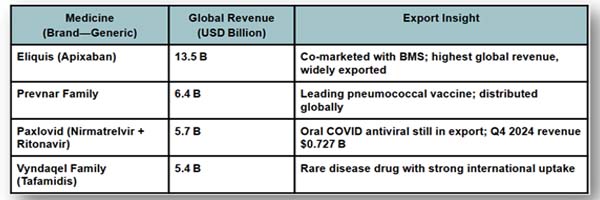
Pfizer's best-selling product, Eliquis, brought in USD 7.3 billion last year. Eliquis, one of the best-selling prescription medications in the world, is co-marketed by the firm with Bristol Myers Squibb worldwide. According to Pfizer Import Shipment Data by Import Globals, with sales of USD 6.4 billion, its pneumococcal conjugate vaccine, Prevnar, is the world leader in pneumonia prevention and experienced high demand in both developed and developing nations.
Despite down from pandemic highs, Pfizer's COVID-19 antiviral Paxlovid generated USD 5.7 billion in 2024, which is still noteworthy because many nations store antivirals as a public health measure. Pfizer's entry into specialized rare disease markets is evidenced by the USD 5.4 billion recorded by Vyndaqel, a niche medication for transthyretin amyloid cardiomyopathy.
Latest Statistics Snapshot
Based on Pfizer's 2024 annual report, Q1 2025 filings, and the most recent industry insights, the table below summarizes the company's recent trade-related statistics.
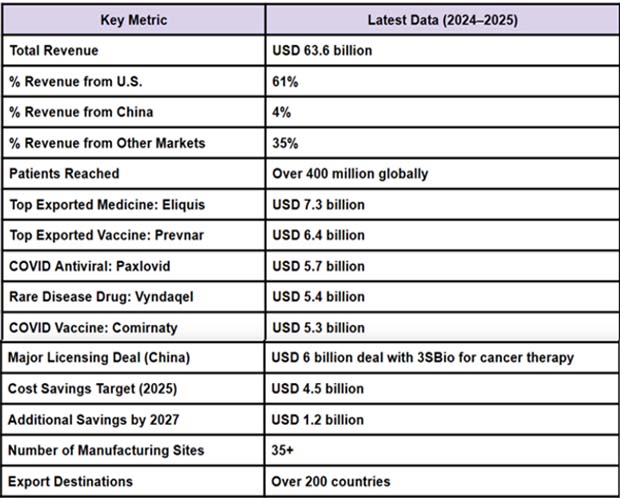
Trends Affecting Pfizer's International Trade
Pfizer's ability to export is based on both its strategic decisions to adjust to changes in the worldwide market and its successful medications. Based on Pfizer Import Export Trade Analysis by Import Globals, Pfizer and its counterparts have been forced to localize manufacturing, enter into license agreements, and engage in region-specific R&D collaborations as a result of growing geopolitical tensions and trade obstacles.
Additionally, the business is putting more and more emphasis on digital supply chain solutions. Pfizer uses AI and predictive analytics to monitor temperature-sensitive goods, optimize shipping routes, and modify manufacturing schedules in response to demand signals from global markets.
Furthermore, as per USA Export Import Global Trade Data by Import Globals, Pfizer's future export success will also depend on its innovation pipeline because patent cliffs for key blockbuster medications are imminent. It is rapidly growing its research in immunology, vaccines, and oncology, fields that are expected to account for the majority of its exports during the next ten years.
International Trade, Access, and Public Health
The export network of Pfizer contributes significantly to global health equality. The corporation has pledged to increase access to medications in low- and middle-income nations through differential pricing and licensing initiatives, even though detractors frequently draw attention to price disputes. Actually, according to the Access to Medicine Index, which monitors initiatives to lower the cost of pharmaceuticals in underdeveloped regions, Pfizer routinely places in the top 5 pharmaceutical firms.
For years to come, Pfizer is probably going to be at the forefront of global supply strategies for vaccines and antivirals due to the lessons learned from the COVID-19 pandemic and the increased focus on pandemic preparation.
What's Up Next
Pfizer's revenue trend appears to be stabilized as of 2025. According to its forecast, adjusted earnings per share will range from USD 2.80 to USD 3.00, while yearly revenues will continue to fall between USD 61 and USD 64 billion. The company's varied export portfolio and licensing-driven growth in Asia will continue to produce robust trade flows even as COVID-related sales normalize.
Pfizer's efforts in automation, regional production, and digital logistics will be crucial to maintaining its position as a major pharmaceutical company on a worldwide scale as new medications hit the market and robust supply chains are required by global health systems. Import Globals is a leading data provider of USA Import Export Trade Data. Subscribe to Import Globals to get more global trade details!
FAQs
Que. What is Pfizer’s main export product?
Ans. Eliquis, a leading blood thinner, is currently Pfizer’s biggest single revenue driver globally.
Que. How many countries does Pfizer export to?
Ans. Pfizer exports its medicines and vaccines to over 200 countries worldwide.
Que. How big is Pfizer’s revenue from China?
Ans. China accounts for about 4% of Pfizer’s total revenue, but the market is growing thanks to new licensing deals.
Que. What steps is Pfizer taking to handle trade barriers?
Ans. Pfizer is localizing production, expanding U.S. capacity, and partnering with local firms abroad to mitigate tariffs and supply chain risks.
Que. Where can you obtain detailed Pfizer Import Export Global Data?
Ans. Visit www.importglobals.com or email info@importglobals.com for more information on up-to-date data.
